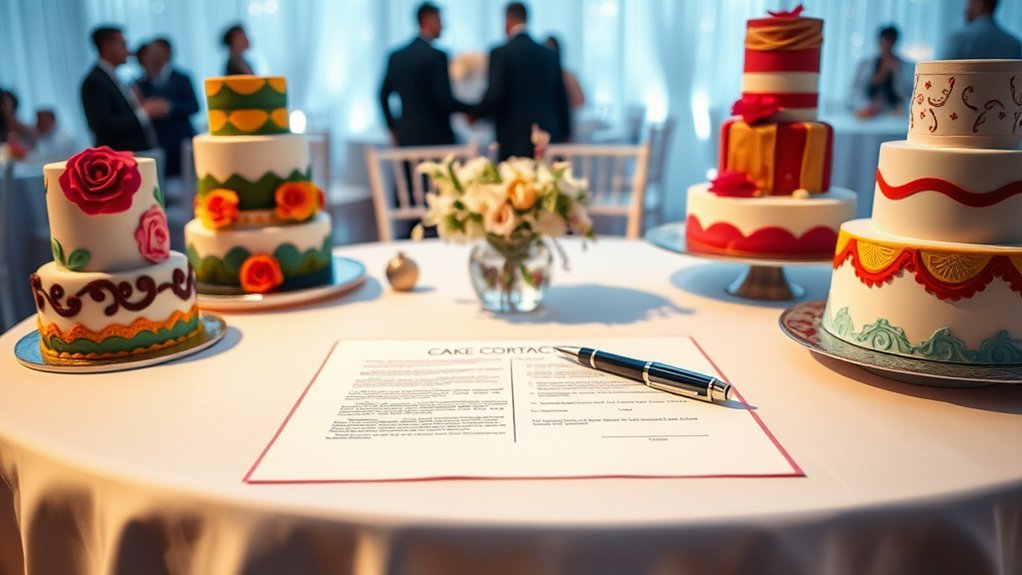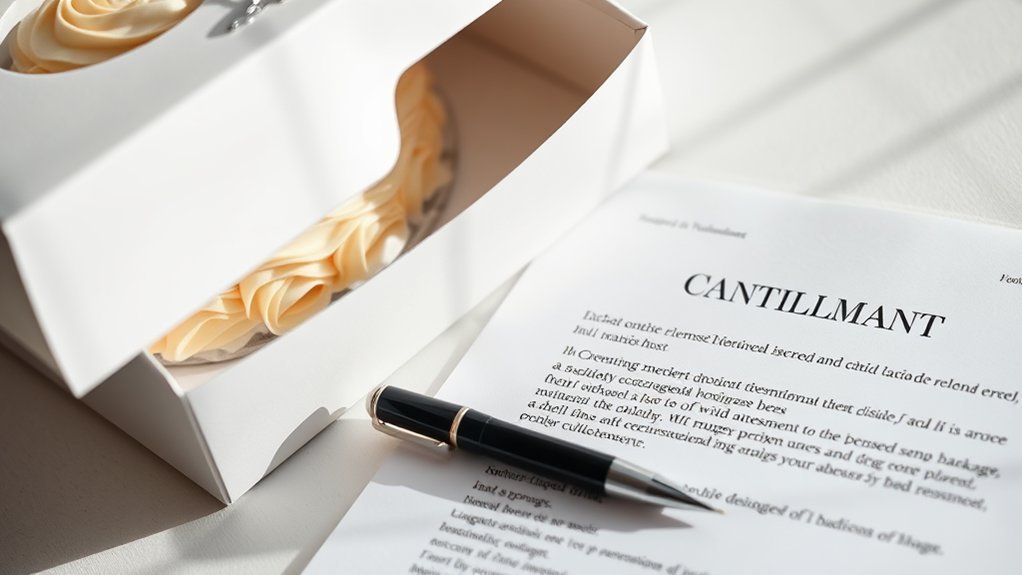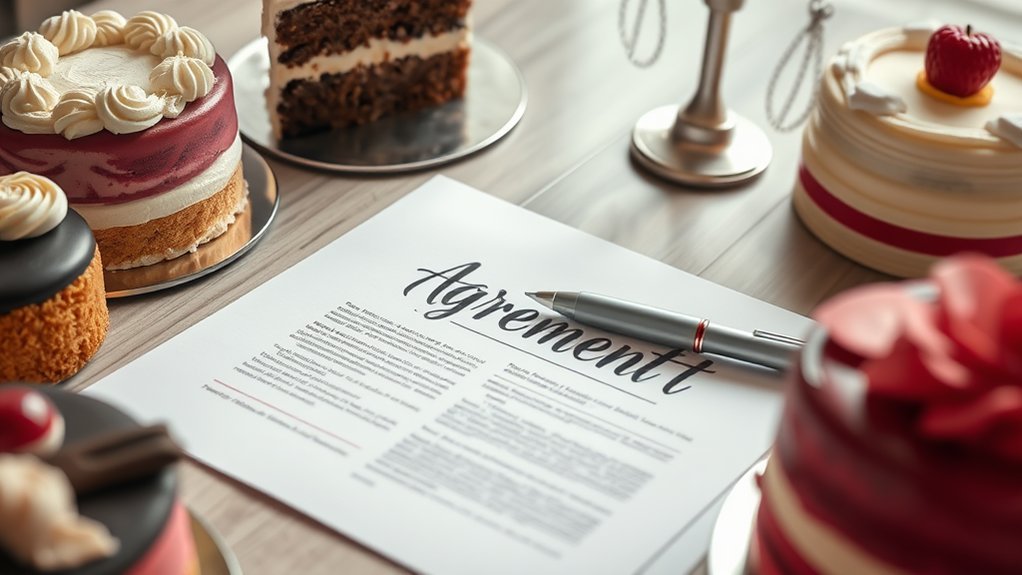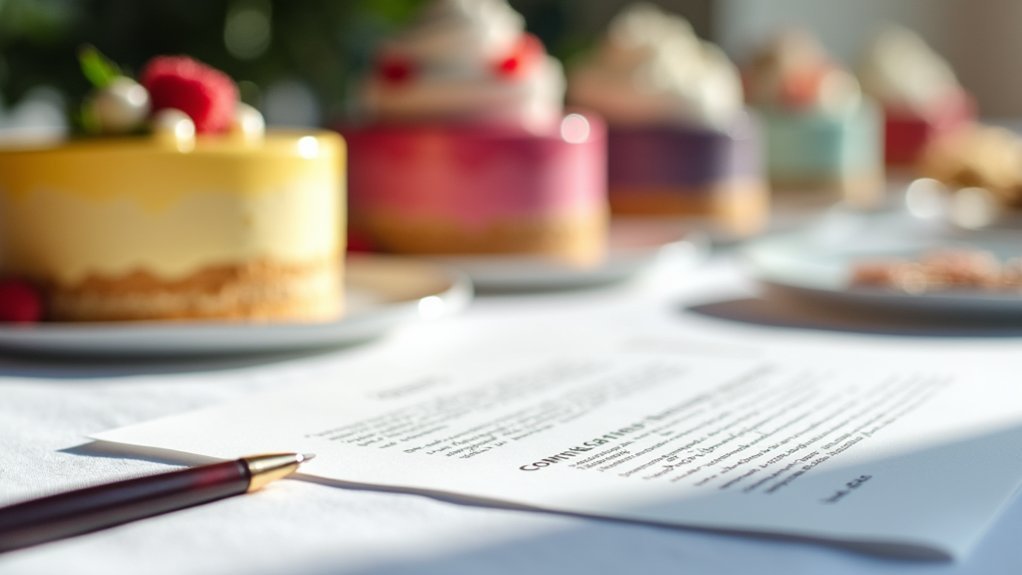What to Look for in a Wholesale Cake Agreement
In a wholesale cake agreement, ensure you have clear contact details, comprehensive event specifications, and specific cake design elements. It’s essential that pricing structures are straightforward and payment terms are clearly outlined, including deposits and accepted payment methods. Don’t forget to include allergen information to foster customer trust. Additionally, clarify liability for any damages and your cancellation policies. By prioritising these elements, you’ll create a strong foundation for your transaction and reduce the risk of issues arising. More useful insights are available.
Key Takeaways
- Ensure clear contact details for both parties, including names, phone numbers, and email addresses for effective communication.
- Specify detailed cake specifications, including design elements, sizes, servings, and allergen information to avoid any misunderstandings.
- Outline transparent pricing structures, detailing costs, any additional fees, and payment terms to prevent unexpected charges.
- Include terms for refunds, cancellations, and liability to clarify responsibilities and protect both parties in case of issues.
- Confirm delivery and setup logistics, including fees, delivery times, and setup expectations to ensure the event runs smoothly.
Contact Information

When setting up a wholesale cake agreement, it’s crucial to provide accurate contact details for smooth communication. Include your company’s legal name for validation, and mention any trading names (DBAs) if applicable. Specify a contact person to streamline communication regarding orders, and provide both phone and fax numbers for immediate and formal exchanges. An email address is essential as it serves as the main channel for documentation and follow-ups. Additionally, consider including local health standards to ensure compliance in all communications. Don’t forget to include billing and shipping addresses, as these are key for logistics. Additionally, having alternative contact information can be helpful for urgent matters, ensuring quick and effective service. Including a formal agreement in the contract can help secure non-refundable deposits and protect both parties involved.
Event Details

As you prepare for the event, it’s essential to outline the key logistics to ensure everything runs smoothly. Start by specifying the event type, date, and location, along with the exact start time. Communicate the expected guest count to determine the appropriate cake size and presentation. Identify the room location within the venue and coordinate setup timings for an organised approach. Provide contact details for the venue and any event coordinators to enable effective communication. Be sure to note any special requests from the client, as these can significantly affect the overall experience. Additionally, ensure that you have a clear understanding of event details such as any specific cake design specifications that may be required. Consider discussing customer preferences to ensure the cake offerings resonate with the attendees.
Cake Specifications

Cake specifications are crucial for ensuring that the final product aligns with client expectations and the specific requirements of an event. Including clear design elements, such as images or sketches, helps to avoid misunderstandings about the desired outcome.
It’s important to specify the exact size, number of servings, and layers to ensure satisfaction. Ingredient details are vital, particularly for allergens like nuts or gluten, which could impact clients. Offering options for flavours, fillings, and decorations allows for a personal touch, enhancing the client experience. Furthermore, understanding the role of discourse markers in communication can aid in better negotiations and agreements. Suppliers should also be transparent about their ingredient sourcing to foster trust and ensure ethical practices.
Additionally, providing clear handling instructions helps maintain the cake’s integrity during transport and storage. By clearly outlining these specifications, you can build trust and clarity in your wholesale cake agreements, leading to successful events.
Pricing Structure

To understand the pricing structure, it’s essential to have a clear breakdown of costs. This helps you see how each element affects the final price.
Make sure to highlight any additional charges, like delivery fees or specific requests, to prevent any confusion. Being transparent builds trust and ensures smoother transactions in your wholesale agreements.
For example, if you’re ordering bulk items, knowing the total cost upfront, including any extras, can save you from unexpected surprises later on.
Cost Breakdown Transparency
When setting up a wholesale cake agreement, it’s vital to ensure transparency in cost breakdowns, as this directly affects your pricing structure.
Start by carefully analysing your cost of goods sold (COGS), which includes expenses for ingredients and materials, as well as labour and overhead costs. A clear understanding of these factors is crucial for developing effective pricing strategies that maintain your profit margins while remaining attractive to customers.
Conducting market research is essential to establish competitive pricing. Make sure to clearly outline any costs associated with customisations to avoid surprising clients later.
Furthermore, consider offering quantity discounts to incentivise bulk purchases.
By consistently tracking your expenses through thorough cost analysis, you foster transparency and build trust with your clients, which is key to establishing a sustainable business relationship.
This clarity can significantly influence your success in the wholesale market.
Additional Charges Clarification
Understanding additional charges is essential for a transparent pricing structure in wholesale cake agreements. Ensure that contract clauses clearly specify any fees that may arise in addition to the base price. Here’s a straightforward table outlining common additional charges:
| Charge Type | Description | Example Fee |
|---|---|---|
| Delivery Fees | Costs for delivering cakes to clients | £50 |
| Handling Charges | Expenses for packaging and transporting goods | £20 |
| Rental Fees | Charges for equipment rental, e.g., cake stands | £15 |
| Late Payment Fees | Penalties for overdue payments | £25 |
| Change Order Fees | Fees for changes made after the agreement | £30 |
Payment Terms and Schedules

Payment terms and schedules are crucial for wholesale cake agreements, ensuring both parties know their responsibilities. Typically, you can expect a prepayment of 25-50% as a non-refundable deposit, with the remaining balance required before the event. Accepted payment methods include cash, cheques, PayPal, and credit cards.
Consider negotiating payment flexibility, such as instalment options, to ease financial pressure. It’s essential to keep track of due dates, as missing a payment could lead to order cancellations.
Also, ensure the agreement specifies the currency and exchange rates for international transactions. Clear communication on these terms will help build a strong working relationship and prevent misunderstandings.
Cancellation Policy

When cancelling an order, it’s important to be aware of the refund conditions set by your cake supplier.
Late cancellations may lead to fees, especially for larger orders like wedding cakes. By following the cancellation policy, you can avoid unnecessary costs and ensure a smoother process.
For instance, if you cancel a wedding cake order less than a week in advance, you might lose your deposit.
Always check the specifics to protect your finances.
Refund Conditions
Understanding the refund conditions for cake orders is crucial for setting expectations and ensuring a hassle-free experience. Refunds typically depend on specific criteria, such as how far in advance you cancel and the type of order you’ve placed.
Many bakeries require a non-refundable deposit, and refunds are usually issued as store credit rather than cash. To qualify for a refund, you need to cancel within the specified notice period; late cancellations may result in reduced or no refunds.
Once a cake is delivered, it’s generally your responsibility, and refunds are seldom granted unless you can provide clear evidence of dissatisfaction quickly.
In exceptional circumstances, like significant errors with your order, bakeries may offer partial refunds or credits at their discretion. Familiarising yourself with these terms can help ensure a more satisfactory experience.
Late Cancellation Fees
When organising an event, it’s crucial to understand late cancellation fees, as these can significantly affect your budget.
Here are some important points to consider:
- Late cancellations usually result in substantial fees.
- Fees may either be a percentage of the total order or a fixed amount.
- Notifications typically need to be submitted in writing.
- Cancelling on time can help minimise financial losses.
- Some bakeries enforce strict no-refund policies.
Be sure to check the specific terms regarding late cancellations and make sure you follow the required notification procedures.
This understanding not only safeguards your investment but also helps maintain the bakery’s operational stability, leading to a better working relationship.
Delivery and Setup

The delivery and setup of your wholesale cake are vital for ensuring your event runs smoothly.
Firstly, check the delivery area and any fees, particularly for locations more than 10 miles away. Make sure you know the agreed delivery time, as it’s important for you to be available to receive the cake.
Discuss what the setup includes and any extra charges that may apply. Before the delivery is finalised, confirm that the presentation of the cake meets your expectations.
Maintain clear communication with the bakery for any last-minute changes, emergency contacts, and alternative collection options. By addressing these points, you can ensure a hassle-free delivery and setup that contributes to the success of your event.
Liability and Damages

In a wholesale cake agreement, it’s crucial to clarify responsibilities regarding damage to avoid disputes.
A clear liability waiver can shield you from unexpected claims, specifying who’s liable for loss or injury.
For instance, if a delivery is damaged in transit, the waiver should outline whether the supplier or the retailer is responsible.
Responsibilities for Damage
Understanding responsibilities for damage is vital for both the bakery and the client, as liability can change based on how the cake is handled and transported.
Here are some key points to keep in mind:
- Clients take on responsibility once the cake leaves the bakery.
- Damage can occur due to mishandling, environmental factors, or transport issues.
- Clearly communicate handling instructions to avoid problems.
- Ensure a secure environment to prevent damage after delivery.
- Check the cake’s condition upon receipt, especially if someone else is collecting it.
Liability Waiver Importance
Liability waivers are crucial for managing the risks involved in cake delivery and handling. By clearly outlining the potential risks, you ensure that clients recognise and willingly accept these risks, which is key for the waiver to be effective.
A well-crafted waiver should include a release clause that protects your business from claims related to injuries or losses. An indemnification clause is also important, as it shields you from legal costs if a dispute arises.
It’s essential to use straightforward language and adhere to UK laws to ensure enforceability. While waivers significantly lower the chances of claims, they don’t replace the need for general liability insurance.
Allergen Disclosure

Allergen disclosure is vital for consumer safety and meeting regulatory standards, especially as food allergies can lead to serious health issues.
When entering a wholesale cake agreement, keep these allergen labelling requirements in mind:
- Major allergens must be clearly listed, such as milk, eggs, fish, and wheat.
- Packaged foods need a “contains” statement on their labels.
- For unpackaged foods, provide written notifications through brochures or signs.
- Bulk foods should include allergen labelling if self-dispensing.
- Clear communication about allergens builds customer trust.
Compliance not only protects consumers but also reduces legal risks.
Change Requests

In wholesale cake agreements, managing change requests is essential for ensuring order accuracy and client satisfaction.
It’s crucial to communicate changes promptly, as flexibility in design often depends on it. For example, if you need to change the size or flavour, please ensure you make your request at least 15 days before the event.
Design changes may need even earlier notice.
If you request significant modifications to your order, be prepared for additional fees to cover the extra time required.
However, minor adjustments that don’t affect production timelines can often be accommodated at no extra cost.
It’s important to document all agreed changes in a revised contract to ensure both parties understand the amendments, protecting your interests and improving service overall.
Dispute Resolution

Disputes can occur in any wholesale cake agreement, so having a clear dispute resolution process is essential for both parties.
Consider including the following elements in your arbitration agreement:
- Arbitration as the Main Method: Specify that arbitration is the primary way to resolve disputes.
- Mediation Before Arbitration: Include mediation as a step prior to arbitration to encourage voluntary settlements.
- Cost Sharing: State how the expenses of arbitration will be split between the parties.
- Defined Procedural Rules: Refer to established procedural rules, such as those from the Chartered Institute of Arbitrators (CIArb).
- Clear Pathways: Outline steps for negotiation and set time limits for starting arbitration.
These elements ensure clarity and efficiency in your dispute resolution process, benefiting both parties effectively.
Frequently Asked Questions
What Insurance Coverage Should I Require From the Baker?
You should require comprehensive liability coverage and product recall insurance from the baker. This ensures you’re protected against claims for injuries or defects, which safeguards your business. For example, if someone has an allergic reaction to an ingredient in a cake, liability coverage would help cover any claims. By securing this insurance, you not only protect yourself but also show your customers that you take their safety seriously.
How Are Intellectual Property Rights Handled for Custom Designs?
When dealing with intellectual property rights for custom designs, it’s crucial to establish who owns the design and to pursue copyright protection. For example, if you create a unique logo for a business, make sure the contract specifies that you retain the rights or transfer them as agreed. This protects your creative work from being copied without your permission. Properly managing these rights ensures your designs remain distinct and safeguarded against unauthorised use.
What Are the Procedures for Post-Event Cake Handling?
After an event, it’s essential to handle the cake properly to ensure it stays fresh. First, inspect the cake for any damage. If it’s in good condition, refrigerate it promptly to keep it fresh. If there are leftovers, consider cutting them into slices for easier storage and sharing.
Always use a sturdy box or cake carrier for transport to prevent any mishaps. If the cake is no longer suitable for consumption, dispose of it responsibly. Remember, the goal is to preserve the memories while being mindful of waste.
Are There Penalties for Late Payments or Changes?
Yes, there are typically penalty fees for late payments or changes. It’s important to review the payment terms in your agreement to understand the specific penalties that may apply for failing to comply or making late modifications. For instance, if you miss a payment deadline, you could face a fee or even interest charges, which can add up quickly.
How Is Emergency Communication Managed During Events?
During events, managing emergency communication relies on established protocols and various communication channels. This ensures timely information reaches everyone, boosts community involvement, and enables coordinated responses. For instance, using social media updates alongside traditional methods like local radio can effectively keep the public informed. Ultimately, these strategies help meet the needs of all those affected.
Conclusion
In summary, when entering a wholesale cake agreement, it’s essential to ensure clear communication and detailed specifications. Make sure to include contact details, pricing structures, and payment terms. Pay close attention to allergen disclosures and liability clauses. Be prepared for potential changes and establish a method for resolving disputes. By focusing on these key elements, you protect your interests and build a transparent, productive relationship with your supplier, ultimately improving the quality of your events.

